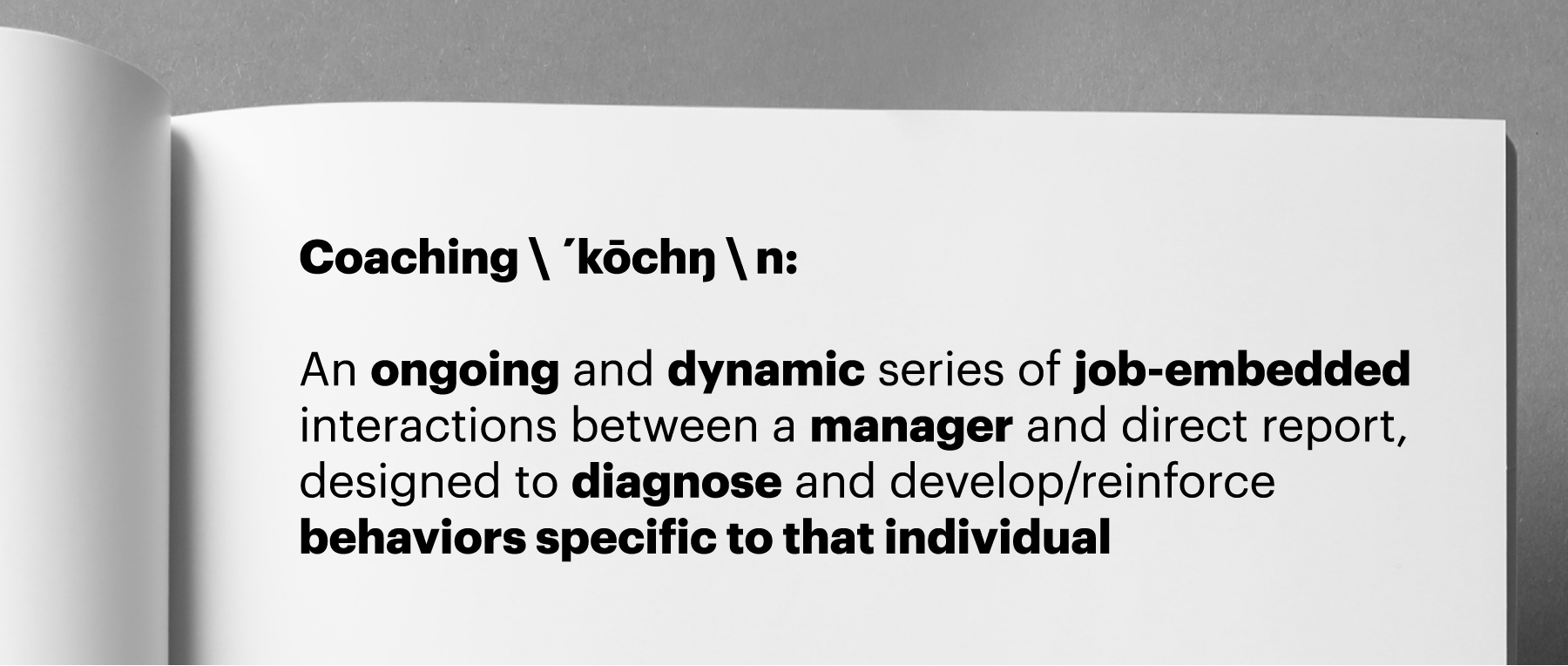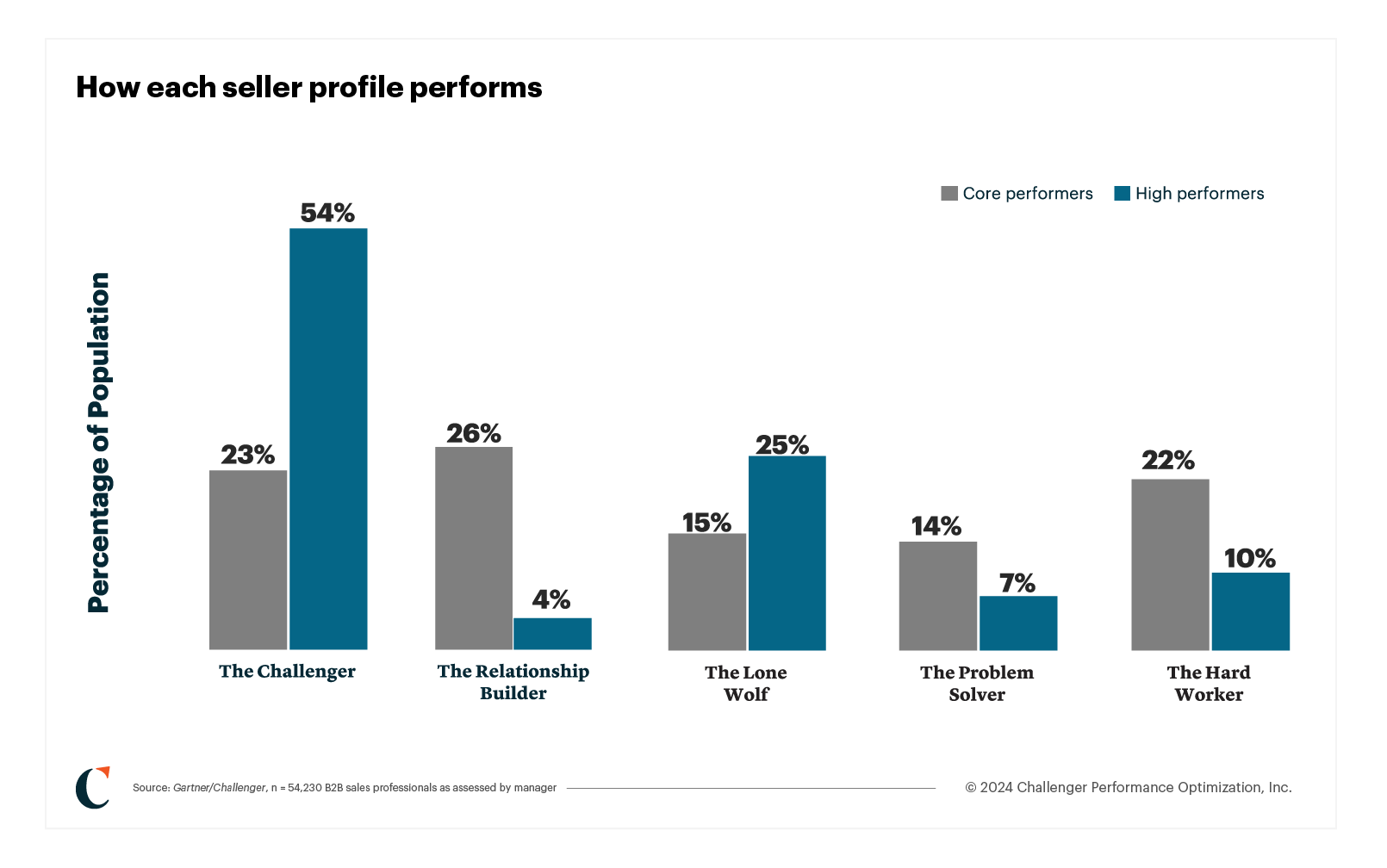Reader Bonus:
Challenger Coaching Guide

Coaching to Challengers is no mean feat. It requires deeply understanding Challenger principles yourself and knowing how to bring them out in others. Sales managers can use this coaching guide to enhance their team’s Challenger skills, identify and develop the capabilities on their teams, plan individual and group exercises, and ensure every sales call follows the Challenger Sales Methodology.
Why coach to Challenger?
In short: because Challengers win.
Back in the early aughts, Matt Dixon and Brent Adamson asked thousands of sales managers to identify the top 20% of their sales force as measured by performance against goal. This research, shared in “The Challenger Sale,” sorted reps into five profiles, then looked at how many sellers fit into each profile — and more importantly, how they performed.

What they found regarding complex sales surprised them — and the sales industry. Core performers came from every category, but star performers came from one dominant category: the Challenger. Of all the high performers in the study, nearly 40% were Challengers. Meanwhile, Relationship Builders (at just 7%) generated the fewest star performers.
Challengers achieve their success, even under difficult circumstances, by convincing reluctant customers to think differently about their problems. When the authors of ”The Challenger Sale” zeroed in on Challenger behavior, they found that this type of seller excels at three interwoven skills.
The core Challenger selling skills

There’s one more skill that separates Challengers from the rest. Challengers build Constructive Tension throughout the sale while Teaching, Tailoring, and Taking Control. For the most skilled sellers, Constructive Tension is a tool to help buyers see why they should move beyond the status quo and toward a New Way. These sellers aren’t afraid to press into difficult moments or point out how buyers should be thinking differently — even if they don’t immediately agree.
What sets Challengers apart…
In addition to the four skills, Challengers typically engage in the following behaviors:
- Maintain a unique view of the world
- Understand their customer’s business
- Are comfortable and prepared to discuss new ideas
- Proactively manage the buying process
- Generate momentum and urgency toward desired outcomes

Your role as a coach

The writers of “The Challenger Sale” also observed that while Challenger behaviors might be innate for some, they can be learned by everyone. Following the steps of the Challenger methodology to learn to Teach, Tailor, Take Control, and build Constructive Tension can make any seller effective in closing complex sales. As a coach, your role is to:
- Focus on developing the capabilities of the individuals on your team
- Create developmental opportunities among your sellers and assess performance and skill growth over time
- Provide and model effective, interactive communication to reinforce Challenger behaviors and enhance problem-solving skills
A checklist to build Challengers
We know that most Challengers aren’t born – they’re made. Effective training and coaching can help sellers who identify as a Relationship Builder, Problem Solver, Hard Worker, or even a Lone Wolf, become a Challenger. These steps will help you develop and nurture Challenger sellers in individual and group settings.
One-on-one meetings
- Open a discussion on how Challenger selling positively impacts customers to drive better results
- Share how customers react to the Challenger approach
- Have sellers describe how they applied Challenger skills to a recent sales interaction
- Review Challenger skills and concepts
Team and leadership meetings
- Ask peers about their team’s Challenger successes
- Share valuable internal and external resources that provide customers with a unique perspective (Also part of developing your Commercial Insight)
- Identify any resources you need to build Challengers on your team
Ask your team how you can help
- “How could I better support your shift to a Challenger approach?”
- “Where are our team’s biggest strengths? How can I reinforce them?”
- “What Challenger skills should we practice in our next team meeting?”
Check out CEO Andee Harris’s interview with Dan Dal Degan, “Mentoring the Next Generation of Successful sales Leaders.”
Reinforcing Challenger skills
Coaching Challengers requires careful reflection on deals in each seller’s pipeline with an eye to their application of Challenger skills. Use these coaching guides to pressure-test your team’s use of Teach, Tailor, and Take Control.
Key Skills
Offers unique perspective
Do...
- Share insights relevant to customer’s current challenges and areas of focus
- Prepare a theory or hypothesis regarding the customer’s needs (to be tested during the conversation)
- Challenge the customer to think differently about their business
Don't
- Lead with a discussion of products
- Bombard the customer with excessive questions
Drives two-way communication
- Ensure understanding of the customer’s unique situation by paraphrasing their thoughts
- Look for verbal and physical cues showing the customer is surprised or interested
- Ask open-ended questions to help uncover valuable information about the customer’s organization
- Ask customer to repeat information
- Move forward without validating pain points and challenge areas
Pre-call planning questions
- What are the business problems we solve better than the competition?
- How do these business problems prevent the customer from achieving their business objectives?
- How does this impact the senior stakeholder team?
- Will this Insight surprise and intrigue the customer?
Post-call planning questions
- Did you intrigue or provoke the customer?
- How could you tell?
- What information would have made your teaching more impactful?
- Is there anything you would do differently on your next call? What impact would that have?
Coaching exercise
Understand the context: Ask the seller to pick one customer account and answer the following questions for your next coaching conversation:
- What are the company’s strategic objectives for the next one to three years?
- Where are they strongest against their competition? Where are they lagging?
- How do the strategic objectives relate to the contact’s role and business objectives?
As the coach, partner with your seller to identify any opportunities to align the customer’s identified business needs with your company’s strengths to craft a more compelling teaching conversation.
Dive deeper: Watch the Winning The Challenger Sale Webinar session “The Teaching Opportunity.”
Key Skills
Offers unique perspective
Do...
- Establish how an opportunity directly impacts the customer contact’s business success
- Think through their strategy for each customer contact—know conversation will vary based on the role and communication preferences of the customer
Don't
- Use generic language that isn’t specific to the customer’s industry, company, and/or role
- Lead with their own personal agenda instead of first grounding the conversation
Identifies economic drivers
- Demonstrate knowledge about the customer’s industry and the current economic climate
- Arm the customer with the data or information to back up assertions
- Presents information in an easy-to-understand format
- Present challenges that he or she will not be able to solve or that are irrelevant to the customer
- Use unrealistic data or irrelevant examples to support arguments
Pre-Call Planning Questions
- What are some of the latest trends in this customer’s industry? How would the customer describe their effect on the company’s operations?
- What is unique about this company’s position in the marketplace?
- Where are they most vulnerable?What are the contact’s job responsibilities and key performance indicators? How will they measure success?
Post-Call Planning Questions
- What did you learn about the customer’s economic drivers?
- What goals, motivations, or information did you encounter that you hadn’t expected? How did you respond?
- What do you think explains the contact’s perception of us compared to our competitors?
Coaching Exercises
Tailored Delivery: During your weekly team meetings, assign several sellers to tailor a commercial teaching pitch for two different customers (either two contacts in different functions at the same account OR two different contacts at two different accounts).
- Have each seller present their message back to the team and ask team members to identify how the commercial teaching conversations were different. Can the other sellers identify what tailoring occurred?
- Did the sellers make each conversation unique enough?
Dive deeper:Listen to the Winning The Challenger Sale Podcast Episode “Aligning Sales & Marketing for a Stronger Sales Narrative” with Challenger Principal Executive Advisor and Global Lead for Insights & Messaging Michael Schaumberger
Key Skills
Is comfortable discussing money
Do...
- Focus on the value of the solution — the pain points it solves and the value created for the customer
- Can acknowledge and delay price requests to the appropriate time in the conversation
Don't
- Introduce the details of company’s offering too early, before gaining agreement on the solution’s value
- Allow a pricing discussion to occur on the first call
Drives customers to act
- Anticipate any objections the customer may have to the proposed solution and prepare to respond
- Understand and articulates the outcome they are hoping to achieve by the end of the conversation
- Create a sense of urgency to drive the sales process
- Clearly explain next steps and guides the buying process
- Leaves the conversation open-ended without clarity on next steps or firm agreements to move process forward
- Agree to customer requests without asking questions to understand the customer’s motivation
- Speak up prematurely to fill extended pauses or silence
Pre-call planning questions
- What information do you want to protect from the customer, and what are you willing to share?
- What are your next steps to ensure the purchase process moves forward?
- What is your understanding of the customer’s buying process?
Post-call planning questions
- What did this conversation do to move the sale forward?
- When did you feel most uncomfortable?
- Were you surprised or taken aback by any objections?
- What are the next steps in the customer’s buying process?
Coaching exercises
Developing and asserting value: For your next coaching interaction, ask the seller to prepare two ways to overcome the two most likely purchasing objections for an important account. Review the following together to further strengthen how the seller can maintain the value of their solution:
- How do we address/quantify the risk of not acting when responding to this objection?
- What will change for our key contacts when they move forward with our solution? How will we make them successful? Are we communicating this clearly in overcoming this objection?
- What can the “win-win” proposal be to manage this objection?
Have each seller present their message back to the team and ask team members to identify how the commercial teaching conversations were different.
Dive deeper: Watch the Winning The Challenger Sale webinar session “Preparing for Negotiations.”
More for Challenger coaches
This is just the beginning. Want more? Challenger’s library of resources and trainings features a wealth of insights for Challenger managers and coaches. Explore our podcast episodes, webinar sessions, and resource center full of articles on coaching and more. We’ll see you there!


